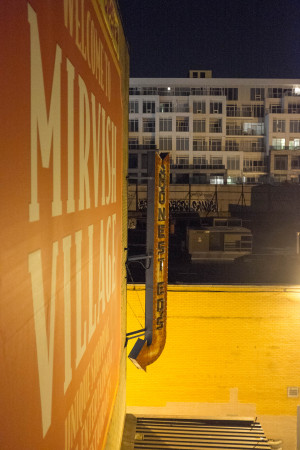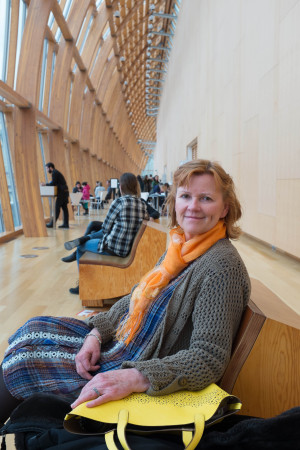Category: Toronto
Tutorial attendance
Having finally finished grading the second set of late essay assignments, I am now calculating the participation grades for my tutorials in the fall and winter term.
The profile of attendance across time isn’t as flat as one might like, but doesn’t look too dismal:
On Wednesday, I am invigilating the final exam, which we are then meant to mark in a week.
I desperately need to be working on my PhD proposal and research ethics protocol, but I also need to apply for a TA position or some other kind of summer job, just to contain the rate at which my PhD savings are being depleted by food and rent.
Mirvish Village 1/2
Evergreen Brick Works
My friend Rosie organized a Massey expedition to the former-brickworks-turned-community-space in the Don Valley.
It was a nice break from grading (and hourly email complaints for students demanding essay and participation grades).
I’m still recuperating a bit from the divestment setback, along with a string of other recent minor misfortunes, so getting out into Toronto’s remnants of green space was a good idea.
AGO wooden staircase
Divestment discussed by the Governing Council
U of T: the President and the Governing Council
U of T President Meric Gertler’s decision to reject fossil fuel divestment in favour of ESG screening was formally presented to the Governing Council today.
UofT350.org held a rally outside, and Gertler’s remarks were followed both by questions from governors and a five minute presentation from Graham Henry, a second-year law student who has been deeply involved in the divestment campaign and spoke against the president’s choice.
In the questions (which came before Graham’s remarks), most of those who spoke commended the decision. One even thanked the president on behalf of steelworkers in the fossil fuel industry. A couple had limited questions about timelines, and one spoke out clearly in favour of divestment.
I was disappointed that what I see as the central issue never came up: the implications of further investment in long-lived fossil fuel infrastructure. Many people mentioned the 1.5 ˚C warming limit from the Paris Agreement, but nobody drew the contrast with the billions of dollars the fossil fuel industry continues to invest in projects that only make sense if we intend to warm the planet by much, much more. The issue, therefore, is less that the conduct of the fossil fuel industry in the past has been severely injurious to people all over the world (though it has) and more that their future plans are catastrophic for people everywhere, ecosystems, and all the life we know about in the universe.
President Gertler criticized divestment as empty symbolism, less meaningful than having U of T’s secretive and unaccountable financial managers in the U of T Asset Management Corporation adopt some new screening criteria. The symbolism with the potential to be highly meaningful would have been pointing out the reality that the fossil fuel industry has no long-term future, or at least none compatible with planetary safety.
If U of T had come out to say that investors everywhere are behaving dangerously and irrationally by continuing to fund fossil fuel development, it could have had a positive impact all over the world. By saying instead that climate change creates some minor financial and ethical issues which can be addressed through existing processes, U of T is fuelling our collective complacency in the face of a slowly-unfolding but nearly unstoppable catastrophe.
U of T’s investments are burning up the futures of their students, but with this decision such conduct has become just one of many minor factors to be considered by financial experts behind closed doors.
UofT350.org
From the perspective of UofT350.org, the group needs to decide what the most plausible strategy is for reversing this decision and what tactics would support that outcome. It also needs to do some deeper thinking about what the group is for, now that divestment has become an even more unlikely prospect. People have very different ideas — for instance, about ‘intersectionality’ as a strategy for success versus a rabbit hole of distraction (this connects to a broader debate about climate change as a leftist versus a pan-ideological issue). There’s also the question of what can be accomplished via protest tactics, particularly when confronting a conservative institution with strong constituencies favouring the status quo and skilled at using cover from superficial actions to placate those who care slightly.
Working on climate change activism generally requires experiencing failure over and over, and in the face of an ever-worsening crisis. How can we do that (a) while continuing to reach out to moderates and decision-makers and (b) changing real-world outcomes, rather than becoming an increasingly radicalized and angry sub-population who are easy to dismiss, ignore, or undermine with trivial policy changes?
ESG screening isn’t a substitute for fossil fuel divestment
Following up on their public criticism of President Gertler’s decision in The Varsity, eight out of eleven members of the ad hoc committee published a letter in The Globe and Mail:
Quoting from our report: “The committee recognizes that fossil fuels will remain indispensable and a contributor to social welfare for many years.” We did not recommend universal divestment.
Instead, we called upon the university to lead an effort to, in The Globe’s language, “gradually ratchet down fossil-fuel use worldwide,” beginning with the worst offenders, whose behaviour we should not tolerate. Much like the apartheid regime, the worst offenders need to be identified and isolated. These fossil fuel companies are the ones blatantly disregarding the international effort to limit the rise in average global temperatures to not more than 1.5 C, thereby greatly increasing the likelihood of catastrophic global consequences. These are the companies that are properly the focus of divestment and such a targeted strategy is an application of what has become known as the Toronto Principle.
We tried to get an op-ed, but the G&M was unwilling.
On Thursday, a member of the campaign will be addressing the Governing Council. Before their meeting begins, we will be holding a rally outside.
The Varsity responds to the divestment rejection
The Varsity published a front page article about fossil fuel divestment, written by Devika Desai and including an interview with President Gertler.
Mom in the AGO cafe
Fossil fuel divestment on As It Happens
Responding to an earlier interview with U of T President Meric Gertler (in which the host was impressively spirited and well-informed while pushing back), UofT350.org media representative Amanda Harvey-Sanchez was on CBC’s As It Happens today.
She highlights a key point about how the proposed ESG approach is less effective than divestment: it will be implemented by the people at the University of Toronto Asset Management Corporation (UTAM) who have preferred to do nothing all along.





